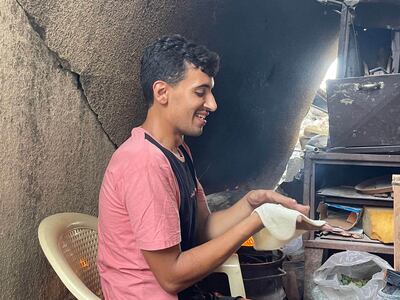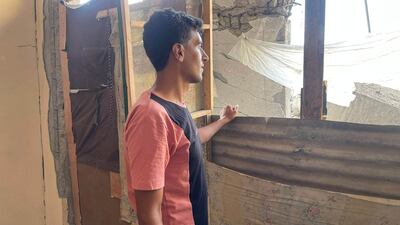Live updates: Follow the latest on Israel-Gaza
Mohammed Isleem used to start his day with a coffee and dessert before heading off to his job at an ice cream factory. Now, after more than nine months of war, his days begin by scavenging for firewood to cook breakfast and his nights are haunted by the fear of losing family members in the relentless Israeli bombardment that has destroyed any trace of normal life in Gaza.
Mr Isleem, 29, lives in Gaza city, one of the first areas to be targeted in the Israeli military's ground invasion after the October 7 attack on southern Israel by Hamas. As with most of Gaza's urban areas, large parts of its main city have been reduced to rubble.
"My dream is to sleep deeply without hearing the sound of drones or worrying that I might wake up to the sound of bombing that could take my family away from me," Mr Isleem told The National.
More than nine months since the war erupted in the Gaza Strip and civilians are still struggling to cope with the lack of food, water and medical supplies at a time when the UN has declared a famine in the besieged enclave.
The National followed the daily life of Mr Isleem, an ordinary Gazan, who spoke about his struggles since the outbreak of the war.
"I dream every night of taking a hot shower to cleanse and wash away the heavy thoughts that make us weak," he said.

He used to work in an ice cream factory but since the start of the brutal war he is now responsible for the well-being of his eight member family, comprising his parents and siblings.
On a typical day, he collects wood, food and fresh water to ensure his family survives.
After gathering wood to light a fire, his family prepare whatever is available for breakfast, either cans of fava beans and hummus, or dukkah and za'atar.
“We make a pot of tea, but only use one spoonful of sugar because sugar is extremely expensive in northern Gaza,” he said.
Gaza's humanitarian situation has deteriorated since early May, as the war has spread to the south, hitting aid flows amid restrictions by Israel, which has accused UN agencies of failing to distribute supplies efficiently.
“Before the war, I used to spend 30 minutes after waking up taking a shower, having my coffee and then going to work. Now, it takes more than four hours just to start the day,” he said.
Searching for water in hot weather
After breakfast, Mr Isleem gets ready with some neighbours to fetch fresh and salty water.
He walks for about 500 metres in the heat to reach a tank for fresh water. It costs $1 to fill a gallon jug, which is expensive for most Gazans. The journey home is exhausting so he rests every 100m.
"We dream of drinking cold water, but unfortunately, the water we drink is hot due to the weather," he said.
Salt water is used for washing and cleaning. Mr Isleem schedules a time for when the water arrives in the neighbourhood every few days. He then stores it in a barrel to use in the bathroom and for cleaning.
“I always remind my family to use water sparingly because it’s scarce,” he said.

The struggle to find food
Mr Isleem says the real struggle begins when he starts to look for daily food.
He gets on his bike and goes to a market called Sahaba, which was set up after the war started.
Gaza resident
He looks for anything the family could eat but, unfortunately, the market mainly offers canned food and limited vegetables.
“Do you know what it means to miss certain foods and not be able to eat them? Not because of a health problem or a shortage of money, but because you are being punished for deciding to stay home," he said.
He waits an hour in the queue at the bakery to buy bread that typically lasts his family a day.
"If the line is too long, I bake at home. I love baking with my own hands, using a fire stove. It reminds me of the old times," he said.
After the toil of looking for food, he takes an hour to rest each day, before he begins repair work on the damaged family home with his father.
Finally, in the evenings Mr Isleem and his family visit neighbours for a few hours to talk and catch up. They avoid using flashlights for fear of drawing the attention of Israeli forces. "We are dreaming of the day the war ends," he said.


